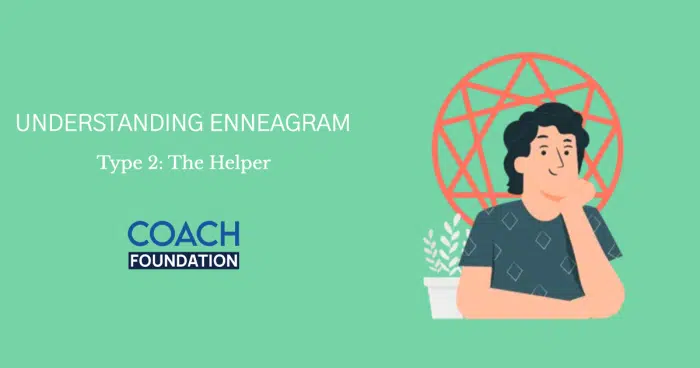Blog » Coaching Models and Techniques » Enneagram Type 2: The Helper
Enneagram Type 2: The Helper
Are you the kind of person who loves helping others and prefers to be seen in a positive light? Do you derive happiness from making sure people around you are well-taken care of, with no attention or reward sought on your part? If so, chances are you might have enneagram type 2 – The Helper. Let’s first check out my formerly covered comprehensive guide on Enneagram to get a basic idea of the topic.

In this blog post, we will explore what it means to be an enneagram type 2 individual. We will also delve into its implications for self-improvement, emotional management, and aspirations. You’ll learn about the strengths Type 2 possesses through embodying a caring and generous attitude towards others.
Read on for getting insights on:
1. How does the Enneagram figure explain type 2
2. Who are Enneagram type 2
3. If you are an Enneagram type 2
4. Enneagram type 2 wing
5. Enneagram type 2 level of development
6. How to identify your Enneagram type
Let’s get started!
How does the Enneagram figure explain Type 2?

The Enneagram figure type 2, also known as the Helper, is one of the most complex personality types in this circular map. Type 2 individuals are naturally nurturing, generous and selfless people who often put others’ needs in front of their own. They are skilled at expressing love and understanding for those around them.
However, type 2 tend to find it hard to turn that love and compassion onto themselves. As a result, Type 2 individuals may feel undervalued or become resentful if those they care for don’t show them the same level of appreciation in return. Learning to recognize and accept their need for healthy recognition is key to fostering emotional well-being for this type of individual.
People with Type 2 feel a deep need for connection and often prioritize their relationships above all else. Externally, Types 2 are warm, kindhearted individuals who are often associated with being generous. Internally, however, they may feel unfulfilled if they cannot consistently express their emotions or think that the people in their life do not truly understand them.
In terms of personal growth, Type 2 individuals must become connected with their emotional depth and reach a space where expressing emotion can occur without every conversation ending in emotional turmoil or hard experiences. Striking a balance between giving to others while still being able to nurture themselves is key for this type of individual.
Who are Enneagram Type 2

Enneagram Type 2s are considered more on the altruistic end of the personality spectrum. They often have a genuine desire to be and do good for others. Those labeled as Enneagram Type 2s tend to be generous and giving people. They show strong levels of empathy and understanding toward those in need.
They put a lot of effort into pleasing those around them. They hope to always be accepted in return by placing value on relationships. Even though they may not admit it, they are often looking for words or affirmations of appreciation from those around them. Despite this, Enneagram Type 2s have a knack for being very perceptive in social situations which allows for their excellent “people skills”.
Enneagram Type 2 individuals are often characterized as generous, warm, and caring people. They look for ways to make the world a better place. Always placing the needs of others before their own. People of this type have an innate desire to nurture and establish trusting relationships with people in their lives; often having a natural ability to see another person’s needs and provide for them accordingly.
Check out this video for gaining in-depth knowledge of Enneagram type 2.
You’re probably Enneagram Type 2 if…
If you find yourself often putting the needs of others before your own. Are in tune with people’s emotions and feel motivated to provide help whenever it’s needed, then you may be an Enneagram Type 2. Known as the “Helper”, a Type 2 enjoys contributing acts of kindness and being creatively involved in making others feel loved and appreciated.
Despite their altruistic nature, these individuals can still encounter difficulty when managing their boundaries. They have a hard time deciding between giving help and feeling taken advantage of in relationships. With an ability to build strong interpersonal connections, they are passionate about alleviating suffering wherever possible. Consider looking for the following characteristics described below.
Still not convinced if you’re Enneagram type 2? Read about 21 Signs you are an Enneagram Personality for a better understanding.
Empathic
Empathic Type 2s derive fulfillment from being selfless and helpful, listening compassionately to those around them when times are tough. When something bad happens, Type 2s help put it back together with their deep understanding of what the person is feeling. In addition, Type 2s can be distinguished by their strong desire for deep connections with others.
They wear their hearts on their sleeves and take pleasure in caring for others through tangible acts or thoughtful gestures. People with this personality type are naturally empathic, which allows them to have deep and meaningful relationships.
They also have an ability for understanding how their words and actions impact others, enabling them to be gentle, affectionate, and supportive in their interactions.
Intrusive
If you’re an Enneagram Type 2, you likely prioritize giving to others. You also manage the needs of those around you without getting too involved in their actual lives. You may inadvertently push yourself into situations that offer more help or attention than the situation requires. Consequently, those around you might experience this as intrusive behavior.
They also tend to be intrusive as their kindness can sometimes be taken beyond friendliness. If you don’t think twice about how your actions affect others and throw yourself into supporting them without consideration of the recipient’s emotions or wishes, you likely fit this type of personality. But fret not! Knowing the traits of Type 2 can help you become more aware.
Generous
People of this type are known for being particularly generous, often giving more than they get in return to make sure those close to them feel taken care of. This type is loving and compassionate, always looking at ways to give back to the world and those around them.
You often find yourself sacrificing your own needs so that someone else can benefit from what you have to offer
An Enneagram Type 2 may express their generosity through acts such as lending a listening ear or offering up simple compliments when needed. Kindness flows out of their souls naturally and they tend to show ethical conduct toward the people that enter their lives.
You couldn’t be more proud when someone expresses their thanks and appreciation for all that you do.
Manipulative
If you find yourself manipulating relationships to be liked or appreciated, then you might be an Enneagram Type 2. They generally strive to gain the approval of others and are often eager to please. While they don’t usually intend to be manipulative, it is something they may unconsciously do in the pursuit of connection and validation.
You likely find subtle ways of getting the outcome or attention you want from the people around you without making any direct requests. You may also use flattery, guilt-tripping, or sarcasm to influence a decision in your favor when confronting a difficult situation.
Enneagram type 2 wings
Understanding the nuances of the Enneagram type 2 wings is an important step for individuals striving for personal growth. The two variants within this personality type—type 2 with a 1 wing and type 2 with a 3 wing—are generally described as having either a more idealistic or a more pragmatic approach, respectively.
For example, those of type 2 with a 1 wing tend to value being of service to others to live up to their high expectations. While those of type 2 with a 3 wing may emphasize practical solutions and focus on their successes and accomplishments to maintain favor in the eyes of others.
These wings help provide increased insight into an individual, such as type 2’s potential 1 wing tendencies towards perfectionism or type 3 wing tendencies towards ambition or competitiveness. Having a better understanding of how their various types interact can help someone gain clarity on why certain traits may arise in specific situations.
Enneagram type 2 levels of Development
As individuals gain personal growth, they will experience different levels of development within the Enneagram type 2 framework. A detailed version of the Enneagram type 2 levels of Development is described below.
Healthy
Enneagram type 2s reach a healthy level of development when they focus on giving in ways that nourish. Healthy type 2s practice generosity and meaningfully contribute to their families, friends, and communities.
At the healthy level, individuals can tap into their sense of inner awareness. They use it to express themselves in a balanced manner that is deeply compassionate towards themselves and others.
They balance their need to give with an understanding of healthy boundaries, allowing them to set firm limits while still giving abundantly. Type 2s strive for healthier relationships by being more mindful of their motivations and actions. They can forgive easily and come from a place of compassion toward all those around them.
Average
People who belong to this Average level often feel like they are responsible for being a pillar of kindness and compassion. They generally exhibit a strong need for approval from others. They have difficulty saying no when asked for assistance. These individuals may also feel more comfortable in relationships.
On the plus side, those at the average level display optimism and look on the bright side of life. This makes them encourage friends and helpful partners. As their self-esteem grows, they learn to draw boundaries between themselves and other people. They tend to rely on other people’s opinions to decide what is best.
Unhealthy
At Unhealthy levels of development, this type has difficulty receiving due to a lack of trust in others. They may become martyrs who give too much for fear of not being appreciated or loved. This often leads to them feeling unfulfilled or resentful.
Furthermore, Type 2’s may repress their true needs to make themselves indispensable. Thus lacking the ability to sense their own needs and boundaries in relationships. Ultimately, unhealthy levels of Enneagram Type 2 disrupt one’s connection to their true self.
How to Identify your Enneagram Type
Identifying your enneagram type can be a powerful way to gain insight into your personality and behavior patterns. To discover what enneagram type best fits you, it’s important to assess yourself honestly, paying attention to not only the words you use but also the feelings that accompany different situations.
Consider your core beliefs, motivations, strengths, and weaknesses – all of these will be key factors when identifying your type.
It’s helpful to take an online quiz or answer questions in a profile test that can give further clarity into your unique type. Lastly, reflect on the results so you can develop a greater understanding and clarity around important aspects of your life.
Take a look at this video to explore more about discovering your Enneagram type! You might discover yourself learning and developing in parallel with the video.
Infact, I highly recommend you to take the Enneagram Test.
Conclusion
Regardless of Enneagram type, individuals possess traits of each category. The Helper is a very compassionate, generous, and caring personality type. They enjoy having deep connections with others and view relationships as their way of being of service. By learning more about themselves and others, these individuals have the potential to become powerful agents of compassion.
You’re open to sharing your thoughts on whether this piece caught your attention and if there were any overlooked aspects. Additionally, let me know what areas the piece excelled in or any other points you feel should have been included in the comments section.
Frequently Asked Questions (FAQs)
What do Enneagram 2s struggle with?
Enneagram 2s often struggle with boundaries, as they often put others’ needs before their own. They often feel overwhelmed by the emotional labor that comes with those close relationships and may unintentionally sacrifice too much of their emotional energy.
Many find it difficult to recognize their own emotional needs and requirements in relationships. This can cause them to feel rejected when they don’t receive their desired amount of attention or appreciation from others.
Some Enneagram 2s also experience fear of rejection and abandonment, leading to strong feelings of insecurity and even codependency in some cases. Being mindful of both giving and receiving emotional energy is essential for Enneagram 2s to cultivate healthy relationships.
What Enneagram is the most perfectionist?
Type 1, often referred to as The Perfectionist, is probably best known as the most perfectionist type. Individuals who identify with Type 1 place a high value on orderliness, ethics, and excellence.
They demand excellence from themselves and demonstrate this in all areas of life to find self-acceptance. This provides them with the feeling of being more in control of their environment. Type 1s have an innate desire for integrity and justice that can be harnessed into positive action if channeled correctly.
Further Resources:
- Explore the characteristics and insights of Enneagram Type 1 personalities, known for their perfectionism and principled nature, in this in-depth guide: Enneagram Type 1.
- Uncover the traits and tendencies of Enneagram Type 3 personalities, driven and ambitious go-getters, through this comprehensive exploration: Enneagram Type 3.
- Gain a deeper understanding of Enneagram Type 4 individuals, characterized by their creativity and emotional depth, in this insightful analysis: Enneagram Type 4.
- Navigate the distinct features of Enneagram Type 5 personalities, often seen as analytical and independent thinkers, with valuable perspectives and guidance: Enneagram Type 5.
- Examine the traits and behaviors of Enneagram Type 6 individuals, known for their loyalty and skepticism, in this informative exploration: Enneagram Type 6.
- Discover the vibrant characteristics of Enneagram Type 7 personalities, often described as enthusiastic and adventurous, through this engaging analysis: Enneagram Type 7.
- Gain insights into the powerful and assertive nature of Enneagram Type 8 individuals, known for their leadership qualities and strength of character: Enneagram Type 8.
- Explore the calm and peace-seeking qualities of Enneagram Type 9 personalities in this insightful guide to understanding and embracing their unique perspectives: Enneagram Type 9.

